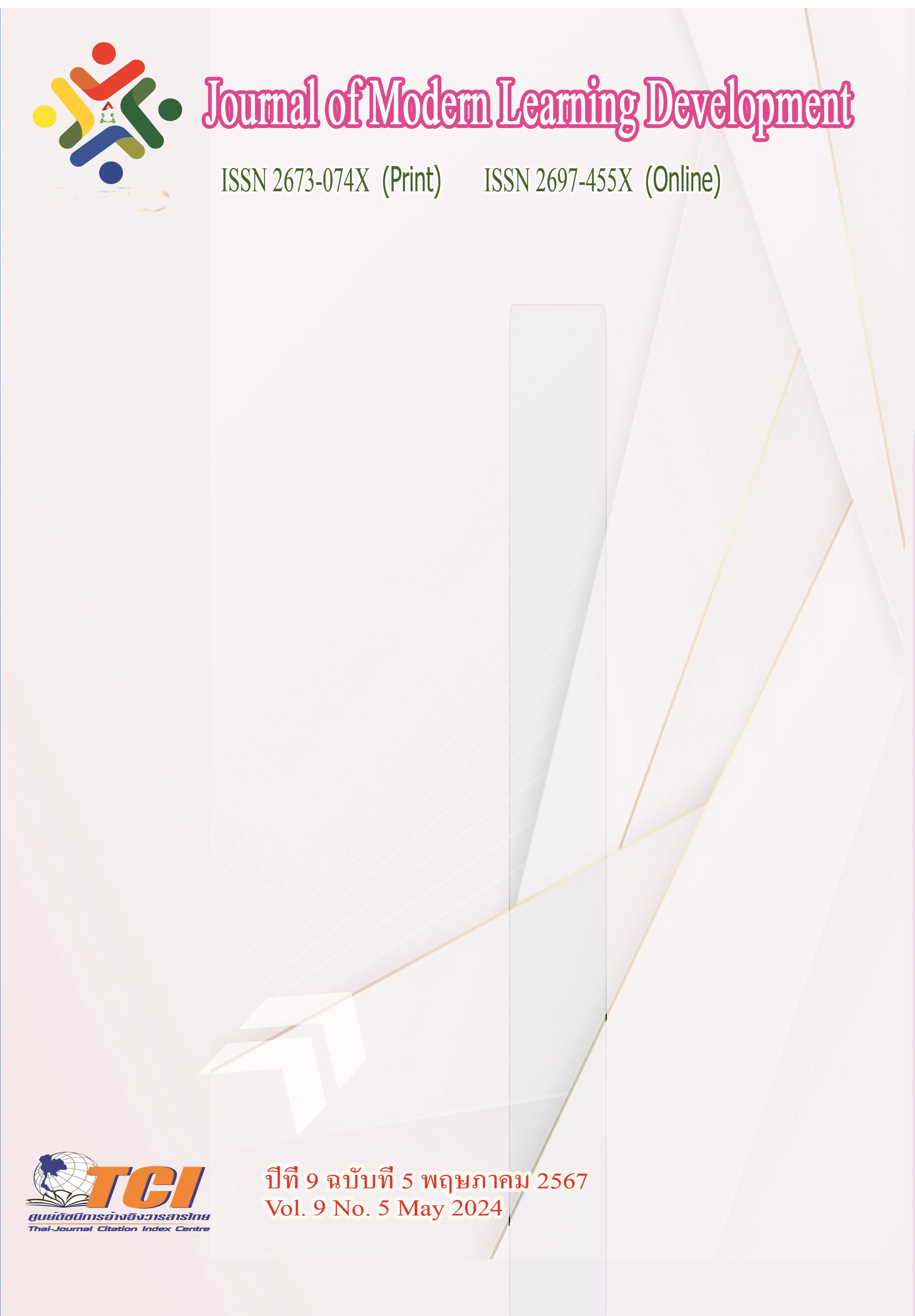The application of Professional Learning Community with Action Learning Supervision Process for Educational Leaders’ Competencies and Teacher’s Learning Management Competencies of the Secondary Educational Service Area Office Bangkok 1
Main Article Content
Abstract
This research to study the problems and needs for developing teachers' educational leadership competencies. Including extracting lessons from developing the learning management competencies of teachers under the Secondary Educational Services Area Office Bangkok 1 using the application of professional learning communities in conjunction with educational supervision through the process of learning from practice using Qualitative. Research-based on Phenomenology, The researchers used in-depth and continuous interviews with key informants with direct experience and teachers in various school subject groups through 4 steps: 1) reviewing relevant documents and research; 2) collecting and collecting data by applying Professional Learning Community (PLC) together with educational supervision by Action Learning process. Triangulation and 4) presented the conclusions obtained from the research by grouping the main issues to present the report as an analytical description.
The results of the study found that The needs for developing teachers' educational leadership competencies are: 1) inspiring and cooperating to achieve the goal By powerfully communicating and conveying the organization's vision, 2) communication and cooperation, and 3) the ability to work under conditions of change and pressure. They are understanding, accepting and coping with changes, listening to opinions from different perspectives and approaches. As for the lesson transcripts for developing teachers' learning management competencies, they suggest guidelines to focus on learning management. Moreover, create a learning process that focuses on the learner—considering the age difference Differences between individuals, including learning management that considers the organization of content that emphasizes transmission to students in a variety of appropriate ways and the maximum benefits that learners should receive.
Article Details
References
คณะกรรมการอิสระเพื่อการปฏิรูปการศึกษา. (2562). แผนการปฏิรูปประเทศ ด้านการศึกษา. กรุงเทพมหานคร: สำนักงานเลขาธิการสภาการศึกษา.
ธีรพันธ์ เชิญรัมย์. (2563). องค์การแห่งการเรียนรู้ : การเรียนรู้จากการปฏิบัติ. วารสารวิจัยวิชาการ. 3 (1), 185 – 196.
บุญชม ศรีสะอาด. (2545). การวิจัยเบื้องต้น. (พิมพ์ครั้งที่ 7). กรุงเทพมหานคร: สุวีริยาสาส์น.
ปวินญาพัฒน์ วรพันธ์. (2565). การประยุกต์ใช้ชุมชนแห่งการเรียนรู้ทางวิชาชีพครู เพื่อการพัฒนาการจัดการเรียนรู้เชิงรุกของครูสังคมศึกษาระดับประถมศึกษา สังกัดสำนักงานศึกษาธิการจังหวัดสระแก้ว. วารสารคุรุพิบูล. 9 (2), 213-228.
ปิยณัฐ กุสุมาลย์. (2560). แนวทางการพัฒนาครูโดยใช้แนวคิดชุมชนแห่งการเรียนรู้ทางวิชาชีพในการจัดการเรียนรู้ สำหรับสถานศึกษา. วิทยานิพนธ์การศึกษามหาบัณฑิต สาขาบริหารการศึกษา. บัณฑิตวิทยาลัย: มหาวิทยาลัยมหาสารคาม.
มณฑลสร ไกรกิติกูล. (2560). การพัฒนาภาวะผู้นำด้วยการเรียนรู้จากการปฏิบัติ. วารสารนักบริหาร. 37 (1), 45-53.
มารุต พัฒผล. (2557). การจัดการเรียนรู้ที่เสริมสร้างการรู้คิดและความสุขในการเรียนรู้. (พิมพ์ครั้งที่ 2). กรุงเทพมหานคร: จรัลสนิทวงศ์การพิมพ์.
มาลินี บุณยรัตพันธุ์. (2559). การนิเทศการศึกษากับการพัฒนาวิชาชีพ. วารสารศิลปศาสตร์ มหาวิทยาลัยอุบลราชธานี. 12 (2), 39 – 53.
วาสนา ปุริโส, สวัสดิ์ โพธิวัฒน์, ศิกานต์ เพียรธัญญกรณ์ และสุรัตน์ ดวงชาทม. (2559). การพัฒนาภาวะผู้นำครูในโรงเรียนน้ำตกห้วยสวนพลู: การวิจัยปฏิบัติการแบบมีส่วนร่วม, วารสารศึกษาศาสตร์ ฉบัับวิจัยบัณฑิตศึกษา มหาวิทยาลัยขอนแก่น. 10 (4), 119-125.
วิจารณ์ พานิช. (2556). วิถีสร้างการเรียนรู้เพื่อศิษย์. (พิมพ์ครั้งที่ 3). กรุงเทพมหานคร: โรงพิมพ์ บริษัท ตถาตา พับลิเคชั่น.
สำนักงานคณะกรรมการการศึกษาขั้นพื้นฐาน. (2553). แนวทางการจัดการเรียนรู้ตามหลักสูตรแกนกลางการศึกษาขั้นพื้นฐาน พุทธศักราช 2551. กรุงเทพมหานคร: ชุมนุมสหกรณ์การเกษตรแห่งประเทศไทย.
สำนักงานเลขาธิการสภาการศึกษา. (2556). แผนการศึกษาแห่งชาติ พ.ศ. 2560 – 2579. กรุงเทพมหานคร: บริษัท พริกหวานกราฟฟิค จำกัด.
สุทธิศักดิ์ อ่อนตะวัน. (2563). สมรรถนะของผู้บริหารกับความสุขของครูโรงเรียนสังกัดกรุงเทพมหานคร. วิทยานิพนธ์ปริญญาศึกษาศาสตรมหาบัณฑิต สาขาวิชาการบริหารการศึกษา. บัณฑิตวิทยาลัย: มหาวิทยาลัยศิลปากร.
FUTURISTNIDA (2563). 3 ทักษะผู้นำที่ต้องปรับในยุค VUCA World. ออนไลน์. ค้นหาเมื่อ 21 สิงหาคม 2566. แหล่งที่มา: https://futurist.nida.ac.th/3-
Glatthorn, A. A. (1990). Cooperative Professional Development: Facilitating the Growth of the Special Education Teacher and the Classroom Teacher. Remedial and Special Education. 11(3), 29–34.
Kutsyuruba, B. (2003). Instructional supervision: Perceptions of Canadian and Ukrainian beginning high-school teachers (Master’s thesis). Saskatoon: University of Saskatchewan.
Marquardt Michael J. (2002). Building the Learning Organization: Mastering the 5 Elements for Corporate Learning. Palo Alto: Davies-Black.
Marquardt, Michael J. (1999). Action Learning In Action. California: Davies-Black Publishers.
Marsick, V.J. (1990). Action learning and reflection in the workplace. In J. Mezirow et al., Fostering critical reflection in adulthood, San Francisco: Jossey-Bass. 23-46
Mcgill, Ian; & Brockbank, Anne. (2004). The Action Learning Handbook. London: Routledge.
Mustafa Özgenel, and Şebnem Yazıcı (2021). Learning Agility of School Administrators: An Empirical Investigation. International Journal of Progressive Education. 17 (1), 247-261.
O’Neil, Judith Ann. (1999). The role of advisor in action learning. Education Doctoral Dissertation Columbia University Teachers College.
Sergiovanni, T. J., & Starratt, R. J. (2007). Supervision: A redefinition. New York, NY McGraw-Hill.


